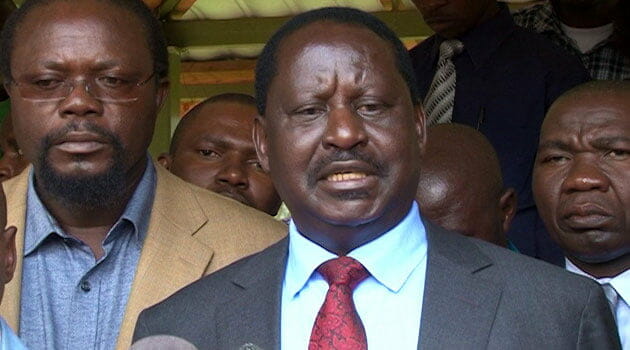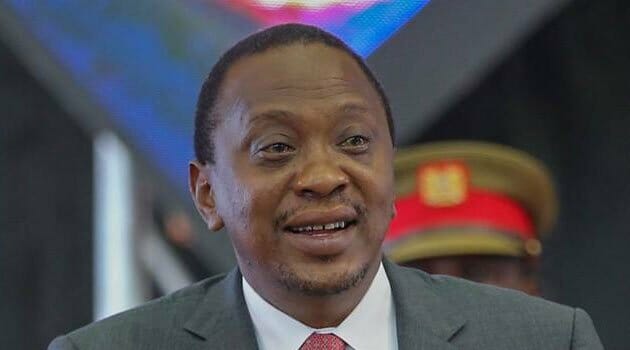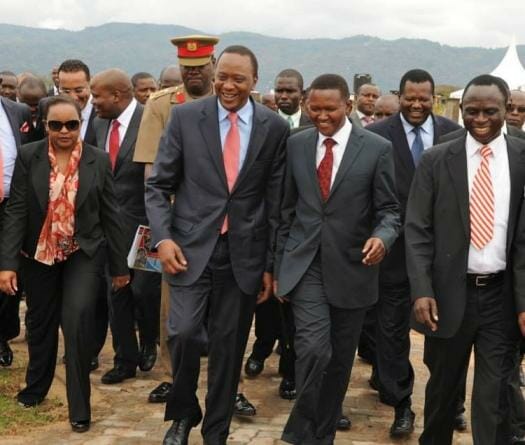On Wednesday, July 8 2015, the leadership of the Coalition for Reforms and Democracy and that of Narc Kenya met the officials of the Independent Electoral and Boundaries Commission in a last ditch effort to express our views on the Strategic Plan that was launched yesterday, July 9, 2015.
At the Wednesday meeting, we expressed strong concerns about the Strategic Plan and appealed for postponement of the launch. We made this appeal based on our understanding that a Strategic Plan is an important tool in providing a sense of direction and outlining measurable goals, guiding day-to-day decisions and also for evaluating progress and changing approaches when moving forward.
We also expressed very specific concerns about the document, among them:
1: PROCESS:
· As Opposition, our views were never sought by the IEBC which came to us at the tail end of the process, when even the date of the launch was already set.
2: CONTENT:
Our concerns in regard to Content included:
· Since this is the first time IEBC was preparing a strategic plan under the new governance architecture, where there are 47 county governments and the National government, the plan should have acknowledge this reality. The IEBC helped create these entities with the last general elections but makes no mention of them.
· In its political environment analysis, the IEBC only addresses what it sees as weak political parties. This is true. However, it does not go into the factors behind this. The law requires political parties to have offices in not less than half of the 47 counties to be fully registered. Operating an office requires money to pay rent, buy and maintain furniture and equipment, hire staff, pay for utilities, security and communication among others. In conservative estimates, a political party would require between Sh. 55-75 million annually to operate and maintain 24 county offices. Currently, only three parties benefit from Political Parties Fund. However, even for these, the money allocated is in violation of the law, which requires that not less than 0.3 per cent of the last audited revenue be allocated. The political analysis should have acknowledged this fact and made recommendation to address this deliberate attempt to kill multiparty democracy.
3: TECHNOLOGY
The elections of 4th March, 2013 were the first in Kenya to attempt to use electronic facilitation. The IEBC, at various stages of the election, deployed the following technologies: (i) Biometric Voter Registration (BVR) during voter registration: (ii) Electronic Voter Identification (EVID) on polling day: and (iii) Results Transmission System (RTS) during tallying.
The Biometric Voter Registration (BVR) kits were meant to help capture the voters’ biometric data. However, during registration, the commission procured only about 15,000 kits to be used in 24,000 registration centers. It has been found that these kits were inequitably distributed ensuring that regions were disadvantaged while others were over-facilitated.
Electronic Voter Identification Devises (EVIDs) were to use the biometric data to identify electors on the polling day so as to ensure we do not have dead people voting, multiple voting etc. These devises failed on 4th March 2013 polling day.
The most phenomenal failure however was exhibited in Electronic Vote Transmission. The IEBC was required to have an electronic Vote Transmission (EVT) System that allows provisional results to be transmitted electronically from all polling stations to the tallying centres, where these results are consolidated and reported. The system was intended to work with GPRS-enabled mobile device that would transmit over a Virtual Private Network provided by the local telecommunication network operators.
The electronic vote transmission system required each polling centre reporting the provisional results of six (6) elections to transmit these results to three (3) different Tallying Centres across the country. The solution should have fully automated the process as required to address the complexity of the expanded scope of multiple elections.
This system failed miserably-not because it encountered technological problems, but because it was apparently designed to fail. At the end of August 2014, the IEBC made public the “Post-Election Evaluation Report on the March 2013 general Elections.” In spite of very visible efforts made to sanitize it, the report is damning and leaves the IEBC badly exposed. Yet, the IEBC makes no reference to it. We can only infer unwillingness to address the issues raised in the report.
The report confirms almost everything that has been observed to be wrong with the IEBC and how it conducted 2013 elections. For instance, the report confirms that not only was there no reliable register of voters, but that the accuracy of the multiple registers used could not be ascertained due to incompetence of the commission staff. It reads: “the accuracy of the register was further affected by the existence of multiple registers: and loss of data due to staff negligence.”
The report further says the register was not complete due to the fact that corrections recommended in the field were not captured by the ICT Department at the Headquarters and were, therefore, not captured in the final register; there was not reconciliation of the registration data from the different regions with that held by the ICT Department; and the time allocated for inspection of the voters register was not adequate.
The report further confirms what has been raised in the last eighteen months with regard to tallying of results not only for presidential polls, but for all the elective positions. It says: “in some cases the forms were not signed or stamped by the responsible officers and in other cases, the comments on the forms were too casual while others went beyond the scope of the Presiding Officers.” It confirms these commissions and discrepancies formed part of the evidence presented in courts in many of the elections petitions subsequently filed. The Plan IEBC launched yesterday provides no answers to these concerns.
We expressed these concerns openly and strongly to the IEBC team and recommended that the best way forward would be to bring all parties under one roof and have them make their input together.
We are therefore dismayed that the IEBC defied our entire plea and proceeded to launch the Strategic Plan. In proceeding despite our appeals, the IEBC has continued to demonstrate a characteristic attitude of impunity and immunity to reason and criticism which a sure recipe for adding to the mistrust and pushing the country towards a controversial poll in two years-time.
We see the Strategic Plan as the latest effort by the IEBC to whitewash the fundamental flaws that have been pointed out by political parties, governance experts and even the Commission’s own internal review so as salvage its questionable legitimacy that has been irreparably battered by its bungling of the 2013 General Elections.
We feel that the IEBC has put the cart before the horse, proceeding without conducting an all-inclusive review of its past activities and making the process mechanical at best.
We are seeing a continuation of the anti-opposition bias. We are seeing a continuation IEBC’s determination that things be done its way and no other way that betrays its lack of interest in holding elections that are seen and perceived to be free and fair.
We are concerned that the IEBC is laying a dangerous foundation in which future elections will not have a shred of credibility because of its anti-democratic and anti-fairness maneuvers that put opposition parties at a disadvantage.
We are watching this turn of events very closely with a view to taking very specific steps in the interest of the country, good governance and democracy.
Hon Raila Odinga; EGH.
CORD COALITION/ ODM PARTY LEADER.
JULY 10, 2015


















































